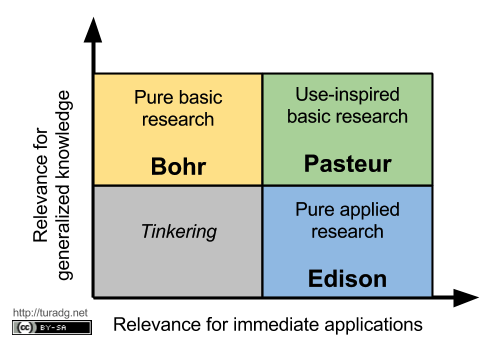The debate about the importance of basic research in innovation was recently reignited by a piece in the Wall Street Journal by Matt Ridley. Much of Ridley’s argument has been ably dismantled by Jack Stilgoe, but there are legitimate questions about how the balance of investment should be distributed between different types of research. There are opportunity costs, both in terms of the investment of financial resources and researchers time. Time and money spent on one type of research can’t be used on another, so there is a need to optimise allocation.
Before thinking about how this balance might work, it is important to be clear about what we actually mean by the term ‘basic research’. As was pointed out some time ago, there are two issues at play here – the nature of the understanding that is being sought in research, and the motivations of the researchers. This gives rise to the idea of the well-known 2×2 matrix:

When people talk about ‘basic research’ they are often conflating motivation and the nature of the research; they mean research that both seeks to answer fundamental questions and is motivated by researchers’ intrinsic interest and curiosity. But it is equally possible that research to enhance fundamental understanding is needed to address specific problems or challenges. Research in three of the quadrants highlighted in the matrix above can deliver benefits to society, and the motivations for carrying out the work are not always obvious after the event. And, of course, the motivations can be mixed.
There is relatively little evidence that seeks to understand what types of research (and motivations) bring about the greatest benefit. One example is an interesting study by Jonathan Grant and colleagues which traced the citation history of clinical guidelines, using these documents as a proxy for broader benefit. By looking at the papers cited in the guidelines, and then the papers cited in those and so on, a type of family tree can be built up. This ‘family tree’ gives a history of the research that has resulted in a clinical intervention.
The analysis revealed that much more of the research cited, even going back as many as four ‘generations’, is published in journals that focus on applied rather than basic research. The result suggests that research with a specific end in mind has contributed more to clinical practice. It would be interesting to see if this finding generalizes to other fields. And it is also worth considering the extent to which the chains of citations used fully describe the influence that research has had on clinical guidelines. However, the analysis does begin to challenge the idea that research that derives from curiosity necessarily brings the biggest benefit.
Another, and somewhat contrasting, source of evidence on the relationship between research and benefits comes from the results of the UK’s Research Excellence Framework. In this assessment, separate scores were given for academic value and broader societal impact for each unit assessed. As I have discussed in a previous post, units that have high scores for academic performance also tended to score well on impact. If academic value is likely to be higher for research that produces fundamental insights, then this would tend to suggest a big role for research of that type in delivering benefits.
There is a different interpretation of the REF results that is also compatible with Jonathan Grant’s work. Perhaps it is the same researchers who deliver research that has high academic value and brings broader societal benefits. There isn’t necessarily a direct link between the research of academic impact and broader benefit, but it is the same talented people who deliver both the advance of knowledge and societal impact.
This idea could be tested using an extension of the citation-based approach of Grant. If I am correct then the researchers who are publishing in applied journals and influencing clinical guidelines should also be publishing more fundamental research at the same time.
So, the question of resource allocation with which I started this post needs to be reframed. It is not about the balance between research that brings fundamental understanding and an orientation towards other goals. Much more important is the extent to which researchers are free to follow their interests as opposed to being directed to address specific questions. Giving researchers at least some scope to follow their interests is important, not just because that research itself may turn out to bring benefits. This freedom also ensures that the very best researchers are motivated to work in our universities, and, while there, they can also turn their talents to addressing broader questions of societal relevance. Both directly and indirectly funding for basic research delivers the benefits we seek.
